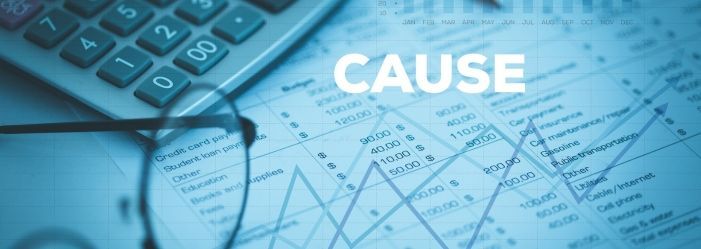Last Updated: April 5, 2024
Primary Reasons for Debt and Effective Ways to Address Them

Disclaimer: We are not qualified legal or tax professionals and are not giving advice. Always speak with a qualified professional before making any legal or financial decisions.
Finding yourself in debt can feel like being stuck in quicksand; the more you struggle, the deeper you sink. But what if you could find solid ground again? This guide not only explores the top five causes of debt but offers practical, actionable solutions to navigate your way back to financial stability.
From understanding the impact of divorce and unemployment to mastering money management and escaping the minimum payment trap, we'll arm you with the knowledge and tools you need to tackle debt head-on and reclaim control of your finances.
If you'd rather speak to a debt specialist now, click here for a free consultation.
Here are The Top 5 Causes of Debt.
1. Divorce
The leading cause of arguments among couples revolves around money more than any other causes of typical domestic disputes. It’s likely that one or both parties had accrued debt prior to getting married and “what’s yours is mine” unfortunately applies to the bills too.
Although it’s recommended to discuss money and spending habits before tying the knot, if couples don’t create a reasonable plan to paying off debt and spending money, it will lead to marital strife that can turn into divorce.
The average percent of divorce in the United States is between 40-50% and the cost of getting divorced is $15,000-$20,000. Also going from a two-income household back to one can take a significant toll on your bank account.
2. Unemployment & Underemployment
No one expects to lose their job and it never comes at a good time. If you lose your job, side hustles and alternate income sources can help mitigate the loss until you find new work. Unless you have the recommended 6 months' worth of expenses stored in your savings account, you’re going to have a lot of accrued debt sooner rather than later.
There’s also the unfortunate occurrence of taking a pay cut when having to suddenly work part-time either due to having a child, a medical issue, or getting fewer shifts at work. We’re creatures of habit, so although our employment status might have changed, it’s very likely that our spending habits haven’t.
People are typically spending more than they earn and recent studies have shown that although income is decreasing, the rate of spending is still climbing, which leads to the next reason for debt.
If you lose your job, side hustles and alternate income sources can help mitigate the loss until you find new work. Consider popular side hustles like rideshare driving, tutoring, freelance writing, etc.
3. Poor Money Management
Related to financial illiteracy, not many people have a good grasp of managing the money they earn likely because they were never taught the simple rules of spending and saving growing up.
These people rely on credit cards for expenses and the idea of instant gratification is a major factor. It’s so appealing for us to buy something and have it now, but pay for it later. If you don’t pay off your credit card balance in full, you’ll end up paying a good chunk of it in interests.
Most credit cards today have an interest rate ranging between 15-20%, making anything you buy cost a whole lot more than what you paid for. This also ties in with impulse spending and making poor financial decisions.
Having a monthly game plan to tackle your common expenses will keep you from spending more than you make. It’ll also be a good idea to educate yourself on the rules of the bank, loans and credit cards to see if you can reduce your fees, avoid late charges and have 0% APR for a set period of time.
To get your finances on track:
- Track expenses to see where your money is going
- Create a budget that aligns with your income and goals
- Pay yourself first by automating savings
- Avoid common budgeting mistakes like underestimating expenses
4. Minimum Payment Trap
So you racked up a credit card and can’t pay the full balance. You know you have to pay something on it so you set up your account to automatically pay the minimum every month and brush it off, feeling assured that payments are being made.
Months later, you check your account and wonder why you still owe so much. Well, that’s interest for you! Here’s an example to give you an idea: If you owe $10,000 on a credit card and pay a minimum of $250 per month and your interest is 15%, you’re going to be paying $3,950 in interest in the 56 months it’ll take you to pay it off.
That $10,000 easily turns into nearly $14,000 before you know it. If your interest rate is 20%, that payment towards interest becomes $6,617 and it’ll take you 67 months to pay it all off! That’s over 5 years of your life spent paying off this credit card while you’re stuck paying off your typical expenses too, such as food, gas, rent or mortgage and a car.
Bottom line is that you should always pay the balance in full, but if you can’t, pay as much as you can as fast as you can. Making minimum payments on credit cards can keep you in debt for years. Use an online calculator to see the difference in interest paid and payoff time between minimum payments vs. paying more. Pay as much as possible each month to pay off debt faster.
5. Military Status
A recent study revealed that members of the military accrue debt at a higher rate than civilians and there are a number of reasons why. First of all, military members may be receiving a steady paycheck but it isn’t large enough to support their means, especially if they’re supporting a family, making them resort to credit cards to compensate.
Next, frequently moving can add to the debt if an active military personnel is forced to sell their home and they can’t get an immediate buyer. They end up paying two mortgages until they receive an offer on their old home. It may also be difficult for the spouse to find a good-paying job right away during relocation.
And finally, when military members find themselves in debt, they end up staying in debt because they don’t want their superiors finding out. They don’t seek out help due to their fear of losing their security clearance, ruining their chances of a career advancement or being discharged. This just makes their debt continually increase.
If you’re currently in one of these situations, there are a number of routes to take to reduce your debt, but the first step should be to come up with a spending plan and stick to it. Review your spending habits and see where you can cut down. Your daily cup of Joe at the local coffee shop can definitely add up in the bills.
Pay your balances in full as often as you can and use cash if you’ve got it. People tend to spend less when they only use real money to pay. And most importantly, if you’re married, make sure you keep all lines of communication open and ask for help if you need it.
In a perfect world, both parties of the couple will be savers but that’s an unlikely story. If you’re the spender, it might be a good idea to have your spouse manage the money until you’ve got a good grasp on saving more money each month.
For military members, add resources like Military OneSource which offers free financial counseling. List programs that provide aid to military families struggling with debt. There's also specialized guidance available at Military Debt Relief for Veterans.
Debt Consolidation and Credit Counseling
Debt consolidation can help simplify the repayment of multiple debts by combining them into one monthly payment. This is usually done by taking out a debt consolidation loan or working with a credit counseling agency.
If you choose to work with a credit counseling agency, they will negotiate with your creditors to come up with a debt management plan. For a deeper dive into various strategies, check out this essential guide on managing debt.
This can provide several benefits:
- Lower interest rates on credit cards and other unsecured debt
- Consolidated payments so you only have one monthly payment
- Waived late fees and over-limit fees
- Possible reduced principal balances
When researching credit counseling agencies, look for non-profit organizations accredited by the NFCC (National Foundation for Credit Counseling). Avoid any agency that charges substantial upfront fees before providing services.
Things to consider when deciding if a debt management program is right for you:
- Your credit score will likely drop initially when accounts are closed.
- There may be origination/enrollment fees.
- You must be able to consistently make the monthly payments.
- Creditors must agree to the terms of the debt management plan.
Overall, a debt management program can be a good option for simplifying payments and negotiating better repayment terms. Just make sure you understand all the pros and cons before enrolling.
FAQs
Conclusion
Debt can easily spiral out of control, but there are ways to take control of your finances again. Carefully evaluate the root causes of your debt situation. Then, make a plan to address those causes which may involve budgeting, finding additional income sources, paying off high-interest debt first, or consolidating payments through a credit counseling agency.
The road to becoming debt-free may be long, but taking it one step at a time will get you there. Stick to your plan, be disciplined, and don’t take on any new debt. For more comprehensive advice on navigating this journey, check out this helpful resource.
If you feel like you’ve tried it all on your own and need professional help, one of our professional and friendly counselors here at Pacific Debt can talk you through your options. Our consultations are free and it’s our goal to get you out of debt for less than you currently owe.
With commitment and smart money management, you can overcome debt and regain your financial freedom. Don’t wait - start today and invest in your financial future.
For more information and to learn more about Personal Finance Tips please visit our Personal Finance Page
*Disclaimer: Pacific Debt Relief explicitly states that it is not a credit repair organization, and its program does not aim to improve individuals' credit scores. The information provided here is intended solely for educational purposes, aiding consumers in making informed decisions regarding credit and debt matters. The content does not constitute legal or financial advice. Pacific Debt Relief strongly advises individuals to seek the counsel of qualified professionals before undertaking any legal or financial actions.
Reduce Your Credit Card Debt By Up to Half

BBB Reviews | 4.9/5.0 Rating









 Do Not Sell My Personal Information
Do Not Sell My Personal Information